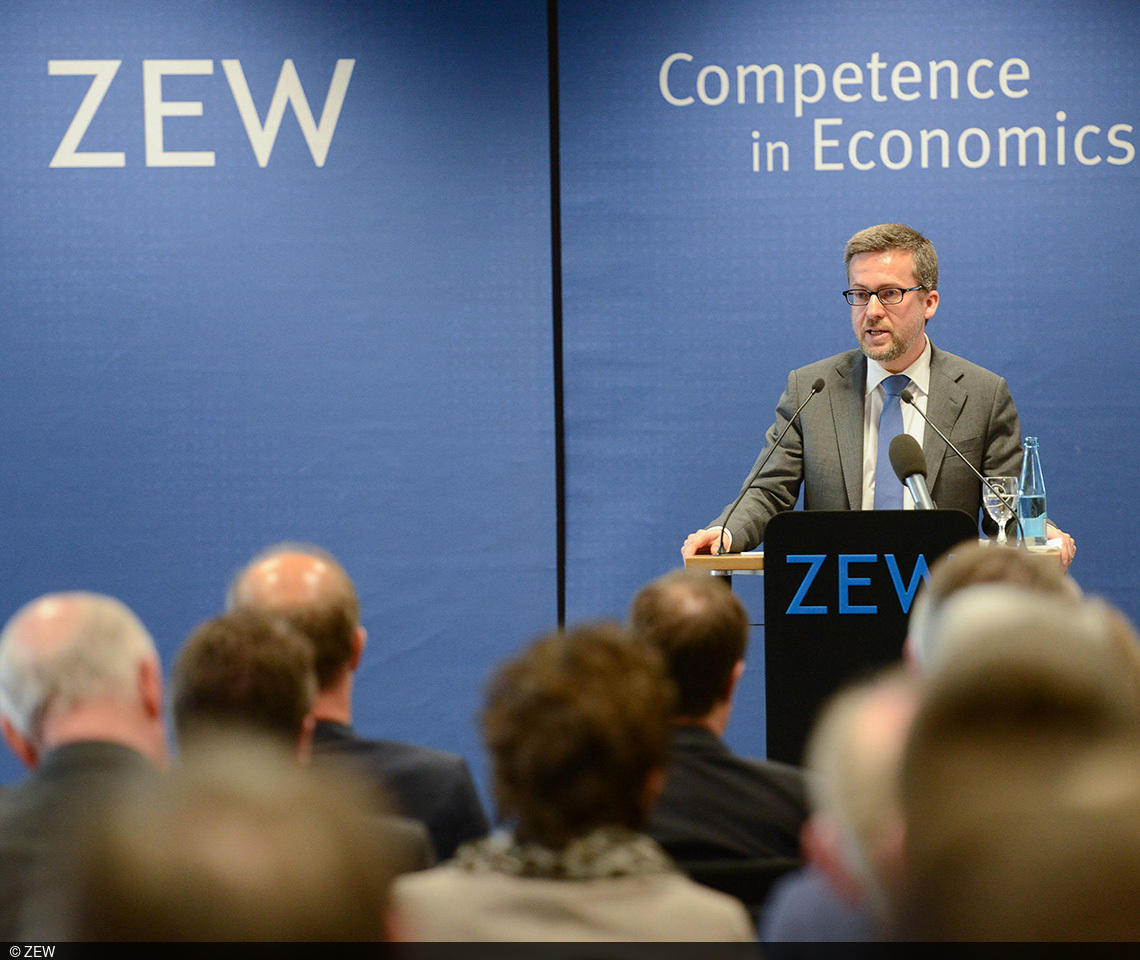First-Hand Information on Economic Policy at ZEW – EU Research Commissioner Carlos Moedas: "Europe Must Increase the Flexibility of its Markets"
Public EventsThe key to competitiveness can be summed up quite simply: More innovation results in greater productivity, and therefore more growth. Research and development, however, are essential drivers of innovation. The critical question therefore is how results from research can be translated into innovations in markets. Carlos Moedas, EU Commissioner for Research, Science and Innovation believes that in the future, innovation will increasingly occur at the points of intersection between various research disciplines.
Protectionism has little role to play here. As Moedas made clear in his lecture on April 13, 2016, which he delivered at the Centre for European Economic Research (ZEW) in Mannheim as part of the lecture series First-Hand Information on Economic Policy, it is much more important that the EU Member States become more flexible and open their markets to keep private investors and their venture capital within Europe.
When it comes to developing and implementing market innovations for the future, Europe remains too risk-averse in comparison to its global competitors. This is something which Carlos Moedas argues can be changed. "It's our job," he explained, "to encourage more Europeans to experiment with their own interests." Up to now, innovation in Europe has been somewhat stagnant. Openness to new ideas seems to be a decisive factor here. "We need to be open to research, to innovation and to the world," emphasised the Portuguese politician numerous times during his lecture and in the subsequent discussion with the audience at ZEW. "I think that the future of innovation lies where various research disciplines intersect." Paving the way for innovation in Europe, however, requires a paradigm shift.
"Effective regulation policy requires that the EU learns from innovators"
Whilst the USA remains the clear leader in the global race to provide businesses with the most favourable conditions, Europe has by no means had to admit defeat. This depends, however, on how competition on this side of the Atlantic is structured. The creation of a digital domestic market, as planned by the EU Commission, determines the direction and nature of innovation efforts. According to Moedas, "it is not so much a question of how much money we invest, but rather increasingly a matter of investing in the correct points of intersection." In order to establish a functioning European market for innovation, Moedas favours a bottom-up strategy over the classic top-down approach. "Effective regulation policy requires that we communicate with business leaders; the EU must learn from innovators." The diversity within Europe shall hereby take on a key role.
With its 28 Member States, the EU is considerably more diverse than the USA. "This is a huge plus for innovation," explained Moedas. Nevertheless, fragmentation of the European market continues to prevent Europe from making the best of this diversity. This is a result of the varying political and economic particularities and regulations within the 28 Member States. The Union therefore finds itself facing a significant challenge. "At the same time", said Moedas, “the diversity within Europe constitutes a huge potential for change, which we must exploit." In practice, innovation activities might be specifically promoted through the provision of more venture capital funding. This, however, would require more investors from the private economy. In this respect, the USA remains streaks ahead of Europe.
"To think that we can benefit from protectionism constitutes pure populism"
On average, venture capital available in Europe totals 60 million euros. In the USA, this value is doubled. How can we encourage investors to invest their money in Europe rather than in the US? "Europe must increase the flexibility of its markets and better align its various national economies," explained Moedas. Reforms are therefore required on a national level to ensure that the markets of the various European Member States are more open to innovation. "To think that we can benefit from protectionism constitutes pure populism," emphasised Moedas.
The Commissioner then provided arguments in favour of his plans to create a European Innovation Council, which shall be established on the basis of a call for ideas within Europe. Together with the EU Framework Programme for Research and Innovation this shall lead to more effective integration of politics, universities, innovators and providers of capital. Using the example of Baden-Württemberg, Moedas illustrated that this type of investment pays off. Since 2007, around 1.2 billion euros of funding from the EU research programme has been invested in Baden-Württemberg – this is more than has been invested in some entire Member States. Moedas drew comparison here with Poland, where in the same period the EU has provided only 450 million euros for research projects.
